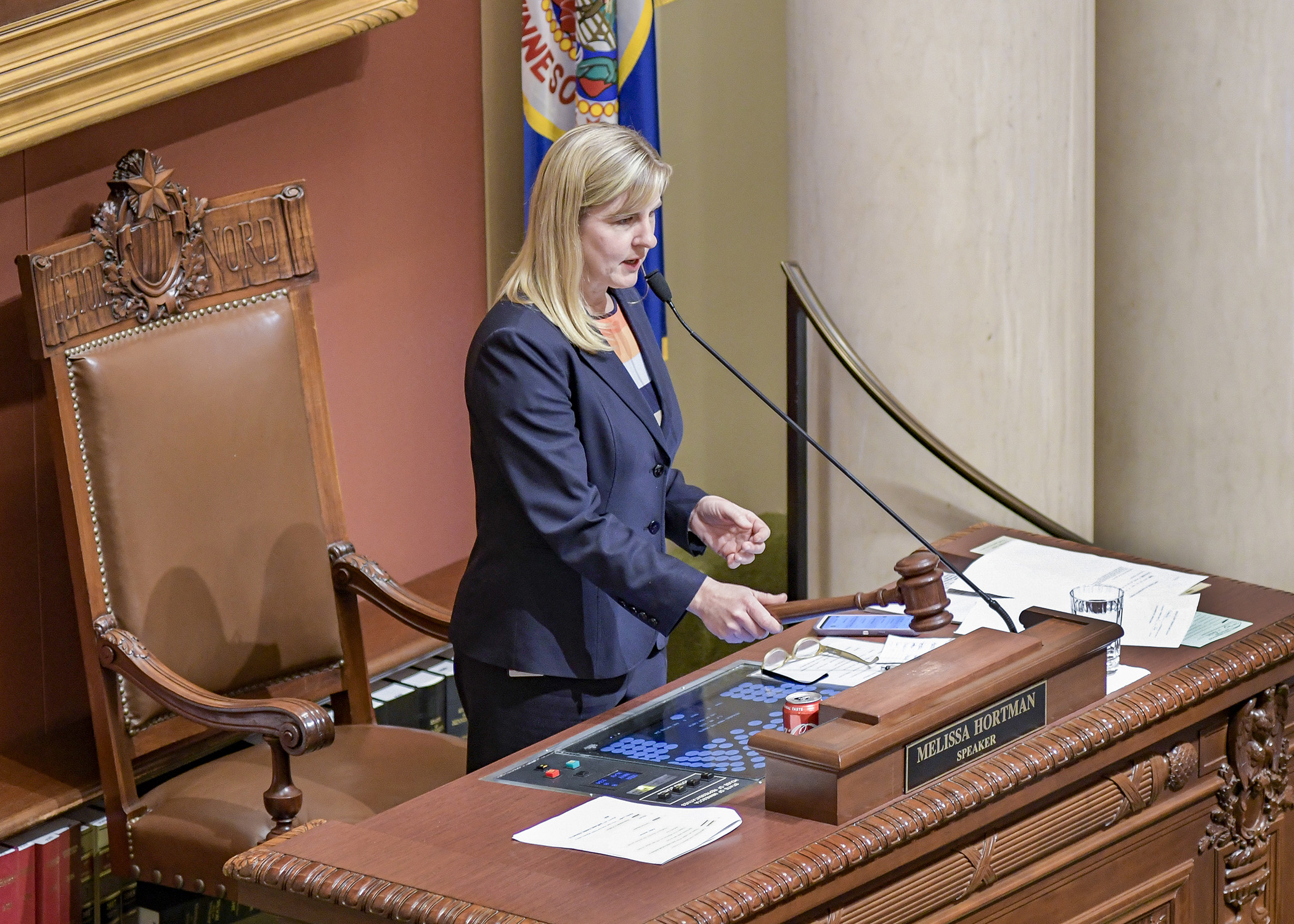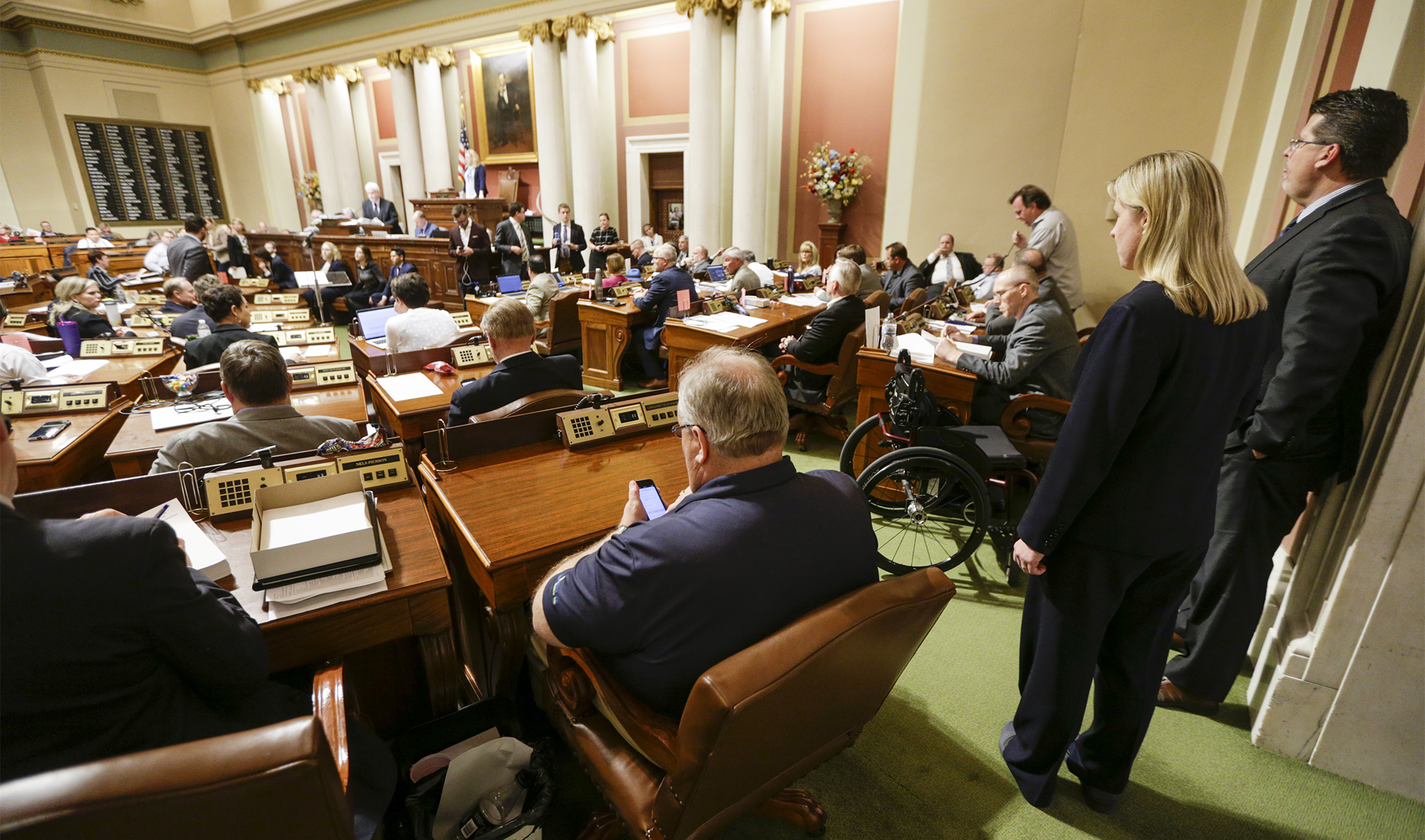Going to OT: Session ends but Legislature's business unfinished

Updated 12:44 a.m. — When a 2020-21 biennial budget deal was announced by legislative leaders and Gov. Tim Walz Sunday evening, House Speaker Melissa Hortman (DFL-Brooklyn Park) noted conference committees were to finish their work by 5 p.m. Monday.
One did. Another did after the deadline, and there was a late push to squeeze in a third.
Needing to constitutionally be done by midnight, a special session is likely soon.
“It looks like the governor and the Senate majority leader and I will be working through the night to iron out some of the details of the more complicated bill areas to give people the remaining direction they need to close up their bills,” Hortman said.
Senate Majority Leader Paul Gazelka (R-Nisswa) has hopes for a Thursday or Friday special session.
“The biggest (challenge) is health and human services. It’s just a giant bill with so many different policy provisions, and even how we fund the whole bill is difficult,” he said at an afternoon news conference. “The chairs and the commissioner are working. That’s just the one I don’t know about. The rest of them I think we can get done.”
[MORE Watch the news conference]
The opioids conference committee finished its work in the late-afternoon and conferees for the $3.4 billion omnibus higher education bill announced a deal — made out of public view — around 8:25 p.m. Both were passed by each body in the session’s final three hours.
The omnibus agriculture department, rural development and housing finance bill was ultimately tabled in the session’s final chaotic minutes, after Republican objections that members were not given a chance to read the 110-page conference committee report, nor see an updated spreadsheet, before voting. Posted at 11:23 p.m., it was passed 48-17 by the Senate a few minutes later with little discussion.
“This is ridiculous the majority is trying to shove this down our throats before time runs out,” said Rep. Jim Nash (R-Waconia).
A conference committee on education finance exchanged offers beginning around breakfast. While steps were taken to complete an agreement, its final grade for the day is not a passing one. The environment conference committee approved compromise policy language a hair before 5 p.m., but it did not receive a House vote.
Other conference committees, including jobs, public safety, health and human services, state government, taxes and transportation, never got together in public.
“This session ended with a whimper,” Senate Minority Leader Tom Bakk (DFL-Cook) said in a statement.
Hortman tried to stay positive.
“There’s a lot of work left to do, but I would say there’s a lot of work that is completed,” she said.
If no budget agreement is reached by June 30, a partial state government shutdown would begin.
While conference committee chairs were coming and going from the governor’s office Monday night reportedly to debrief with legislative leaders and state commissioners, most legislators spent the day lingering in Capitol hallways, squeezing in a little much-needed shuteye or outside under sunny skies following a rainy weekend.
“This has been the least productive, least transparent session in the history of this state,” said House Minority Leader Kurt Daudt (R-Crown).
He has a suggestion for what still needs to be accomplished. “The best thing to do would be to call the special session this Thursday, file the bills so they are public. And then let’s wait a week. Then the public can actually come in and testify on the bills.”
Opioids
Sponsored by Rep. Liz Olson (DFL-Duluth) and Sen. Julie Rosen (R-Vernon Center), HF400, unanimously approved by conferees, would require drug makers and distributors to pay $20.9 million in annual fees and allocate that money to combat opioid use disorders and fund the public safety response from county governments.
Registration fees would sunset once the state recovers at least $250 million from settlements with pharmaceutical companies after a minimum of five years. Any revenue from settlements would be earmarked for opioid response efforts.
Other changes would include: establishment of an Opioid Advisory Council to make funding recommendations, expanded access to treatment services and allowing flexibility at the local and tribal level and new grants to support local and targeted prevention and treatment efforts.
Education Finance
There were plenty of meetings and negotiations, but the omnibus education finance bill conferees appear to be far from bridging their differences and passing a new two-year budget.
At times combative, chairs Rep. Jim Davnie (DFL-Mpls) and Sen. Carla Nelson (R-Rochester) and the other conferees, managed to find common ground on same and similar language provisions Monday. However, no major policy or fiscal decisions were agreed to.
 House Speaker Melissa Hortman, right, stands at the back of the House Chamber during debate on the omnibus agriculture department, rural development and housing bill late Monday night. Photo by Paul Battaglia
House Speaker Melissa Hortman, right, stands at the back of the House Chamber during debate on the omnibus agriculture department, rural development and housing bill late Monday night. Photo by Paul BattagliaThe budget target met in the middle of the two chamber’s proposed bills. The joint target would provide $540 million in additional E-12 funding over the 2019 February forecast, a $373 million decrease from the House proposal and a $312 increase over the Senate’s.
“We know what’s required in that global agreement and then look forward to doing what’s best for our students, focusing on students, funding what works,” Nelson said.
Davnie added, “I think we share an emphasis on serving the students of Minnesota and setting them up for success going forward.”
The agreement would specify a 2 percent increase in the general education funding formula each year of the biennium, totaling $388.8 million. The House’s proposal would have provided 3 percent and 2 percent in the upcoming biennium, whereas the Senate’s proposal would have increased the formula by half a percent each year.
The joint agreement also specifies $3.53 million should be appropriated for tribal contract schools in the upcoming biennium to stabilize and equalize funding for Minnesota students enrolled in Bureau of Indian Education schools. The schools are slated to lose approximately 50 percent of their funding, pending no legislative action.
Conferees were left to decide how best to spend the remaining $147.5 million. Both chambers agree a portion should go to early childhood programs and special education costs.
Environment and Natural Resources
Sponsored by Rep. Rick Hansen (DFL-South St. Paul) and Sen. Bill Ingebrigtsen (R-Alexandria), the omnibus environment and natural resources finance bill, HF2209/SF2314*, stalled on the $324.2 million fiscal target for funding the Pollution Control Agency, Department of Natural Resources, Metropolitan Council Regional Parks, Minnesota Conservation Corps, Board of Water and Soil Resources, Minnesota Zoo, Science Museum and Minnesota Board of Tourism.
Legislators were able to work out a number of policy agreements.
Meeting twice Monday afternoon, the conferees adopted some policy compromises, including a response to chronic wasting disease and creation of the “No Child Left Inside” program aimed at providing community nonprofits and public entities with funding to promote youth natural resources-based education and recreation.
Policy negotiations left on the table include: creation of a wild rice stewardship council, renaming of a state park or structures after Walter Mondale and a wolf hunt ban.
Session Daily writers Rob Hubbard, Rachel Kats, Erin Martin and Tim Walker contributed to this story
Related Articles
Search Session Daily
Advanced Search OptionsPriority Dailies
Ways and Means Committee OKs proposed $512 million supplemental budget on party-line vote
By Mike Cook Meeting more needs or fiscal irresponsibility is one way to sum up the differences among the two parties on a supplemental spending package a year after a $72 billion state budg...
Meeting more needs or fiscal irresponsibility is one way to sum up the differences among the two parties on a supplemental spending package a year after a $72 billion state budg...
Minnesota’s projected budget surplus balloons to $3.7 billion, but fiscal pressure still looms
By Rob Hubbard Just as Minnesota has experienced a warmer winter than usual, so has the state’s budget outlook warmed over the past few months.
On Thursday, Minnesota Management and Budget...
Just as Minnesota has experienced a warmer winter than usual, so has the state’s budget outlook warmed over the past few months.
On Thursday, Minnesota Management and Budget...